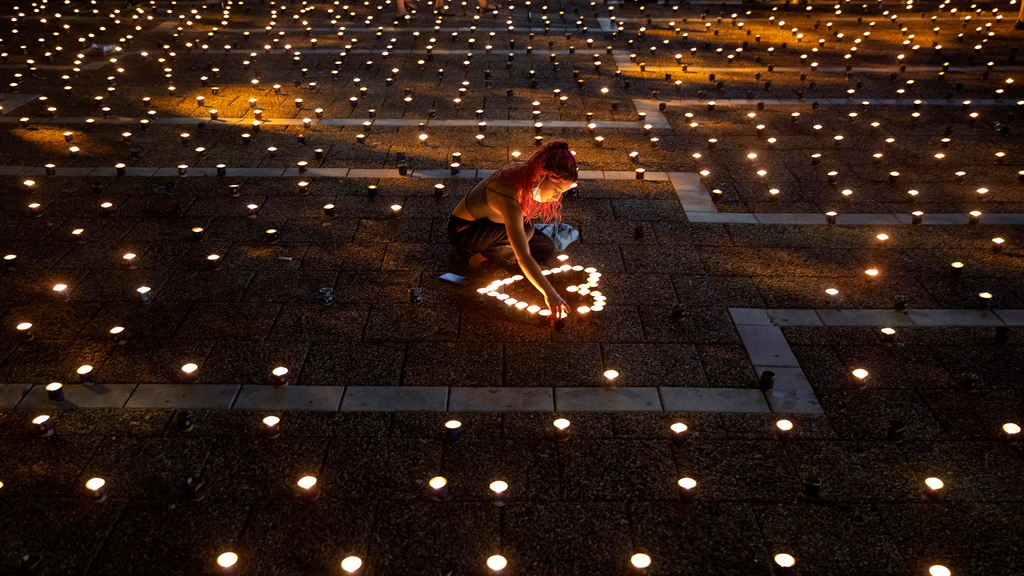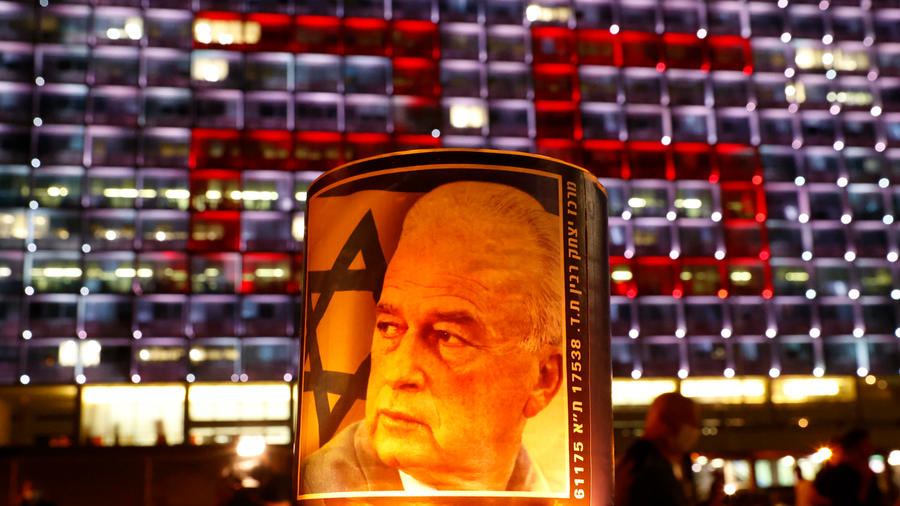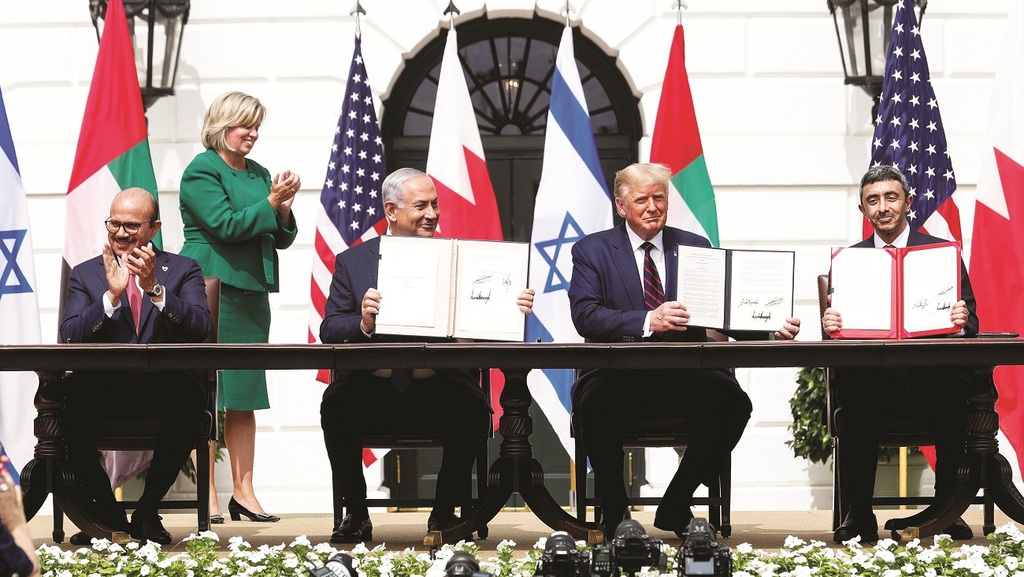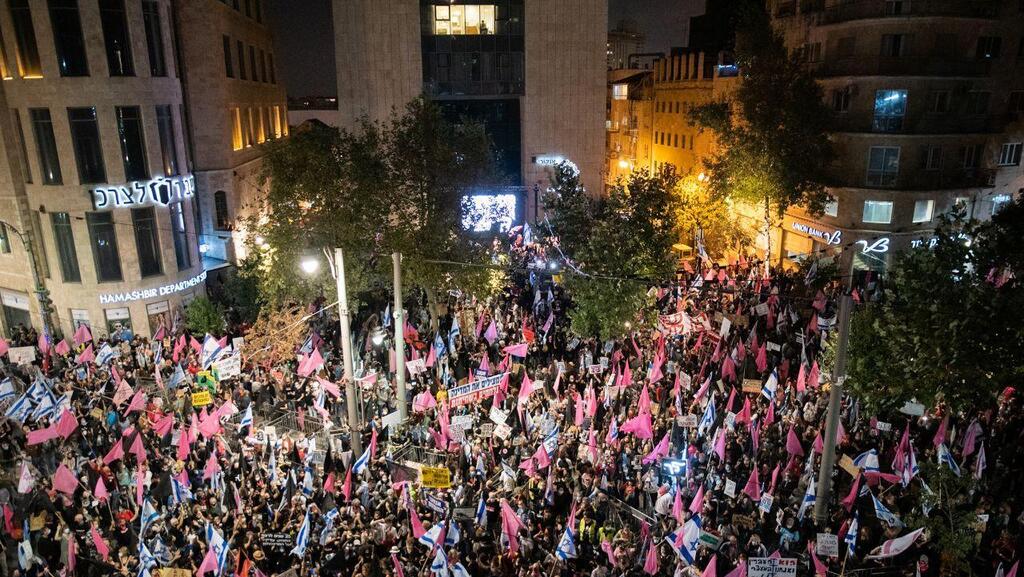Getting your Trinity Audio player ready...
Twenty-five years after Israeli prime minister Yitzhak Rabin's assassination, enthusiasm appears to have waned among a generation of young Israelis who pledged support for the peace he sought with the Palestinians.
On November 4, 1995 -- two years after his famous White House handshake with Palestinian leader Yasser Arafat sealed the historic Oslo accords -- Rabin was gunned down during a peace rally in Tel Aviv.
4 View gallery


Over 25,000 candles lit in memory of assassinated Prime Minister Rabin murdered a quarter of a century ago
(Photo: AP)
His murder by a Jewish extremist opposed to Oslo, Yigal Amir, triggered an outpouring of grief, with young Israelis flocking to light candles in the plaza outside Tel Aviv city hall -- since renamed Rabin Square.
Adopting the motto to "neither forget, nor forgive", waves of young Israelis who asserted their demand for peace came to be known as "Generation Rabin."
For Rabin's granddaughter Noa Rothman, whose emotional eulogy at his funeral captured global attention, the thirst for peace expressed by Israeli youths a quarter century ago has been beaten down by the steady refrain of sceptics.
"We repeated that there was no partner for peace and, in doing so, we sidelined the basis for rapprochement (with the Palestinians)," the 43-year-old told AFP.
While the trauma of his murder persists, Generation Rabin's call to end the Palestinian conflict has dimmed, and for a new crop of young Israelis ending the conflict is not a top priority, said Ilan Greilsammer, political science professor at Bar Ilan University.
Young people "have shifted their focus", he said.
Factions of Israeli society continue to push for change, as evident in the sustained protests against right-wing Prime Minister Benjamin Netanyahu.
"But they demonstrate against corruption and attacks on democracy," not for peace, Greilsammer said.
4 View gallery


A poster of assassinated prime minister Yitzhak Rabin during a memorial rally in Tel Aviv on Saturday
(Photo: AFP)
"Peace with the Palestinians, which was central at Rabin's time, is no longer so," he added.
The professor cited a well-known list of factors that have fueled a "weariness" about peace, highlighting the second Palestinian intifada, or uprising, and the emergence of Islamist group Hamas as rulers of the Gaza Strip.
Israel's occupation of the West Bank, which Oslo was intended to eventually end, has instead seen the continuing expansion of Jewish settlement construction in the Palestinian territory.
As for Rabin's Labor party, it now holds just three seats in Israel's 120-member parliament, the Knesset, a devastating collapse compared to the 44 seats it held in 1992 as Oslo was being negotiated.
"It is difficult to identify anyone who can advance (a peace push)," Greilsammer said.
On Wednesday, to commemorate the anniversary of Rabin's death under the Hebrew calendar, a group committed to preserving Rabin's legacy called "Hozrim La Kikar" held a ceremony in his honor in Tel Aviv.
Group member Yotam Yakuba, 31, told AFP he was not surprised by the waning interest among young Israelis in seeking peace.
"The government in power succeeded in making Israelis believe that we did not need to make peace with the Palestinians," that we could "live with the conflict", he said, referring to the series of Netanyahu-led right-wing governments in power since 2009.
"I don't think you can live in conflict forever," Yakuba added.
Netanyahu has repeatedly boasted that recent normalization deals with the United Arab Emirates and Bahrain proved Israel's relations with the Arab world did not hinge on the Palestinian issue.
4 View gallery


The White House ceremony marking a peace agreement between Israel and the UAE and normalization with Bahrain in September
(Photo: Reuters)
The deals broke decades of Arab League consensus that there should be no normalization with the Jewish state until it makes peace with the Palestinians.
Itamar Banit, who attended a rally in Rabin's honor in Jerusalem on Saturday, insisted that some Israelis were "trying to put the issue back on the agenda".
Banit, who was 14 when Rabin was assassinated, refused to concede that the premier's vision of a viable Palestinian state alongside Israel was defunct.
"It's true that we talk about it less, but the majority of Israelis still support a two-state solution," he said.
4 View gallery


Protesters call for the ouster of Prime Minister Benjamin Netanyahu in Jerusalem on the memorial day for assassinated prime minister Rabin
(Photo: Shalev Shalom)
For Rabin's granddaughter, the fact that there is currently no political momentum in Israel towards peace talks with the Palestinians does not render the cause dead.
"Just because an idea is not popular, does not mean it shouldn't be defended," Rothman said.

